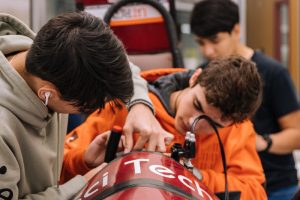Microschool benefits are critical to understand when selecting a private school education for your child. Microschools vary widely in the United States and there is no doubt that more small schools are emerging. From California, to Texas, to New York, new forms of schooling are being created in response to current needs and demands in the education marketplace.
For good reason, parents are tired of their kids getting lost in the shuffle or not receiving the needed support. Therefore, parents are seeking other options beyond large public schools, traditional private schools, parochial schools, and even a transition from homeschooling.
Today, families are seeking an education that reflects their own philosophy, but that will personalize instruction based on their child’s actual needs. In other words, a place they can feel part of a close community and a “home” where their child can learn and thrive.

Pod-Based Learning Engages the Mind
So, just what is a microschool?
“As of yet, there is no common definition that covers all of these schools, which vary not only by size and cost but also in their education philosophies and operating models. Think one-room schoolhouse meets blended learning and homeschooling meets private schooling.”
– Michael Horn, Co-Founder, Clayton Christensen Institute.
To gain a better understanding, let’s look at ten microschool benefits, then drill down into more personal benefits.
Microschool Benefits
- Personalization – In small classes, students receive the individualized attention that is needed for them to grasp material and engage in learning activities. When you think about the one room schoolhouse, where multiple grades were taught, the lines were blurred between ages, subjects, and learning styles. Older students helped young students, alongside a dedicated teacher.
- Small classes – Being in a class of 30-40 students is not conducive to creating the level of excitement needed to really dive into a subject or do unique activities. Teachers with smaller classes get to know each student and can adjust learning to match up with the child’s style.
- Use of technology – Microschools have the unique advantage of being able to incorporate technology without it taking over the whole learning process. They teach kids how to balance their lives and use technology responsibly for research and meaningful connections.
- Research-based – Some highly innovative microschools offer a research-based approach to learning to cultivate a growth mindset in their students.. They may also base their model on neuroscience and other findings, methods they know will actually work in the classroom.
- Community – Just by nature of being so small, microschools are naturally adept at building a close student body. They also engage the whole family in the school’s culture, mission, and values.
- Philosophy – Every school is unique in their approach and outlook, so this gives families an opportunity to choose a school that aligns with their values. This is one of many microschool benefits for a middle or high school education.
- Peer mentorship – Older kids helping younger kids, not only accelerates and supports learning, but also leads to character development. Kindness, compassion, and respect, can all come about from age interactions.
- Broad experiences – Microschools are in a unique position to offer retreats, outdoor education, field trips to cultural places, college campus visits, as well as alternative clubs and sport offerings.
- Low stress – Being in a small school naturally takes some of the pressure off. Kids have a chance to shine in a lower stress environment. Bullying and cliques just don’t seem to happen in microschool environments.
- Impact – A microschool can build the kind of confidence and self-esteem that can lead to a sense of purpose, lifelong friendships, serving others, as well as career interests.
Microschool Benefits – Finding the Right Fit
So, in order to figure out if a microschool could be a good fit, do the following assessment:
- Is your child getting enough personal attention in school from teachers, staff, and their peers?
- How large is your child’s classroom and what would the ideal size be?
- Does your child integrate technology seamlessly into learning, without it taking over his/her life?
- In a research-oriented world, how adept is your child at gathering information to expand their awareness and build knowledge?
- Does your current school offer a sense of community for your child to be of service and build real friends?
- What is your educational philosophy and does it align with your current school’s mission and values?
- Does your child have a chance to interact with younger and older students to both give and receive mentorship and provide educational support?
- What kinds of experiences, both inside and outside the classroom, does your school offer? For example, does your child have a voice in student government or have a chance to create ideas for new sports, trips, and excursions? Does your school offer a retreat, cultural trips, and/or outdoor education?
- If you put your child’s stress level on a scale of 1-10, where would your child fall? Do you need to find a school that offers a low-stress learning environment to combat anxiety, stress, or depression?
- What are your expectations for your child’s education? What impact would you like your child to make on the world once they head off to college or a career? What kind of person would you like your child to become?
Finding a Microschool Near You
So perhaps your responses are leading you to dig deeper and explore the world of microschools in your area. Although the purpose of this article is not specifically geared towards finding a microschool near you, you can begin with internet searches for “microschools’ or “microschools near me.”
For example, if you live in Houston, you will find one of the original microschool pioneers – Memorial Private School. Listed on Private School Review, it is ranked as a top private schools in Texas. Moreover, Memorial Private is designed to be leader, year after year, in what a microschool can do. As shared on their website, here is a brief commentary:
“The MPS microschool (also called small schools and pods) has proven to be an incredible solution for secondary education, and has become more important with the onset of anxiety, COVID, virtual learning, and with schools becoming too large or overcrowded.
Long before the recent re-emergence of smaller schools, Harry and Pamela Camp founded Camp Education Group (CEG) in 2002. They created the design and standards needed for an innovative private school model with a unique infrastructure, and founded Memorial Private School. This is built not only on research of best practices over the years, but also on new neurological practices that support the teaching and learning methods unique to our school.”
The private education landscape is changing significantly. This means, families will need to respond to paradigm shifts as they select the best school for their child.
In summary, microschool benefits are highly significant, both in general, and to every student attending one. With this in mind, we should continue to expect more microschools to populate the U.S. map as this education option becomes increasingly more popular and accessible.
#microschools #podbasedlearning #researchbased #KhanAcademy #SalKhan #PamelaCamp #HarryCamp #Houstonprivateschools #privateschools #independentschools #collegeprep #neuroscience #teaching #learning #education #secondaryschool #middleschool #highschool
